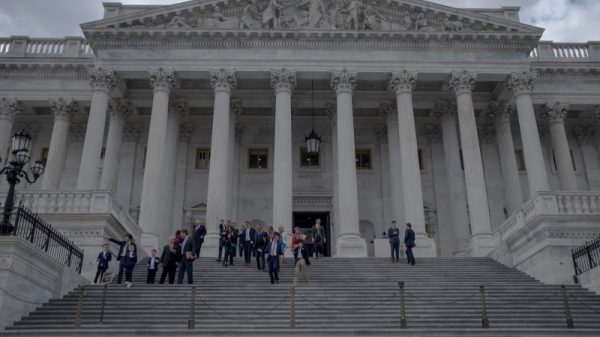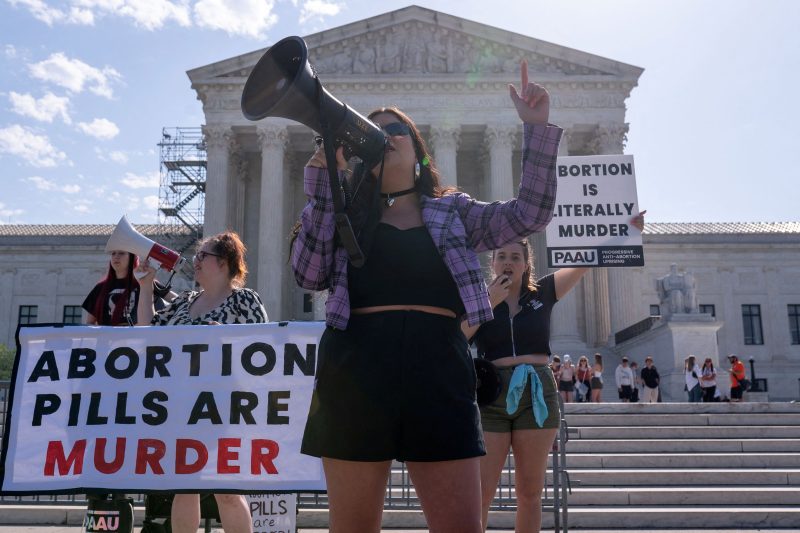It was a telling moment in abortion politics: A federal judge in Texas last year moved to cut off the most popular method to end a pregnancy — and Republicans skipped the celebration.
The reason for the muted response to the ruling, which suspended federal approval of the abortion pill mifepristone? Republicans didn’t want to talk about it because the abortion issue had already stung them politically. They were the proverbial dog who caught the car. They finally got the Supreme Court to overturn Roe v. Wade after decades of trying, and they soon found that Americans didn’t much like abortion rights being curtailed.
But starting Tuesday, it could become significantly more difficult for Republicans to ignore the electoral liability.
The Supreme Court on Tuesday could once again thrust abortion rights into the body politic as it hears arguments in the mifepristone case. A ruling is expected by June.
It seems unlikely that the justices will go as far as the Texas district court judge; the case now appears to hinge on restricting the pill’s use rather than suspending its Food and Drug Administration approval.
The U.S. Court of Appeals for the 5th Circuit in August scaled back the Texas decision, ruling instead that older FDA guidelines must govern the pill’s use, because the FDA didn’t follow the proper process for the new ones. The ruling, which the Supreme Court temporarily paused, could effectively end telemedicine prescriptions for the drug and jeopardize retail pharmacies’ ability to dispense it. It would also trim the window for prescribing the drug from 10 weeks of pregnancy to seven weeks. While that might not seem like a huge change, woman generally can’t confirm they’re pregnant before four weeks, and about half of medication abortions happen after seven weeks.
Combine that with the fact that an estimated 63 percent of abortions are now medication abortions, and even something akin to the appeals court’s ruling would significantly curtail of abortion rights.
All evidence suggests that would be a ruling that reverberates.
Polling has long shown that mifepristone enjoys broad support:
A Fox News poll after the Texas decision showed Americans supported the pill remaining legal more than 2-to-1, 65 percent to 30 percent.A KFF poll showed an even wider gap, with Americans saying 72-27 that the pill should be legal at least in “most cases.”A Marquette University Law School poll showed Americans said 76-23 that states shouldn’t be allowed make it illegal for people to get the pill from out-of-state providers.A Public Religion Research Institute poll showed Americans opposed laws making it illegal to receive the pill through the mail, 68-27.A Reuters-Ipsos poll showed Americans opposed the Texas decision 68-28.
And perhaps the most illustrative number: A PRRI survey before the Texas decision showed banning the abortion pill was about as unpopular (72 percent opposed) as some other extreme proposals. Comparable numbers included making providing an abortion a felony (74 percent opposed) and banning abortion altogether except to save the life of the mother — not even allowing it in cases of rape and incest (72 percent opposed).
These polls, of course, are more directly applicable to the Texas decision than the appeals court decision. What’s apparently more relevant now is how Americans feel about restricting mifepristone rather than banning it altogether.
And there, views are more nuanced. A Washington Post-ABC News poll last year showed 66 percent said mifepristone should remain on the market, but that included 12 percent who agreed with that while saying it should be more restricted than it is now.
That would suggest a significant chunk of the country could be convinced that limits imposed by the Supreme Court might be appropriate.
But even then, just more than one-third said the pill should be taken off the market (24 percent) or more restricted (12 percent).
And it seems quite possible that even those who entertain restrictions might not like what the appeals court did or the Supreme Court does. The window for medication abortion is already significantly smaller than the window for other types of abortion in most of the country. And polls show that more than 7 in 10 Americans have opposed banning abortion at six weeks — similar to the seven-week window the appeals court would have put into effect.
Beyond that, polls have shown there’s little appetite for the courts to inject themselves in decisions like this; the KFF poll last year showed Americans said 60-39 that it was inappropriate for a court to overturn FDA approval of a drug.
Combine all that with the Supreme Court’s suggestion that it would keep major abortion decisions at arm’s length and that Republicans have argued this should be a state issue, and you begin to see how problematic this could be for the political right if the nation’s highest court significantly curtails the predominant abortion method.
We don’t yet know what the Supreme Court will do. But over and over again, we’ve seen how putting these decisions in the hands of legislators or judges can have significant and troublesome consequences for the GOP. Most recently, that was the case with the Alabama IVF ruling that caused a GOP stampede in the other direction.
And as that showed, Republicans won’t always be able to ignore these things and hope they go away.







































